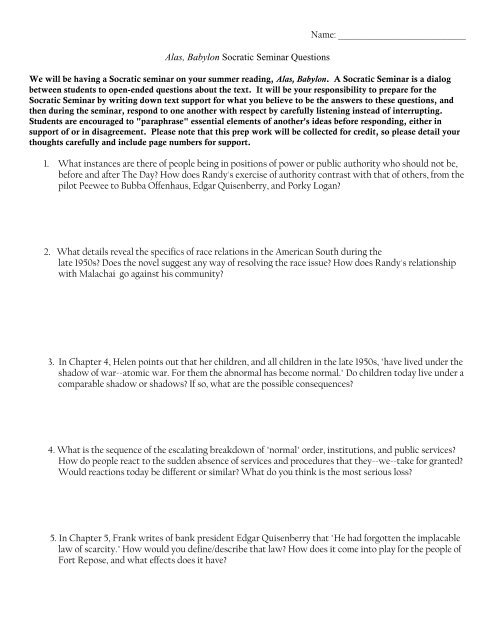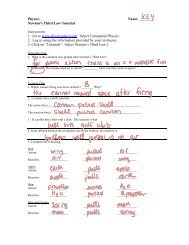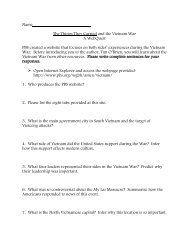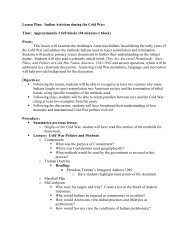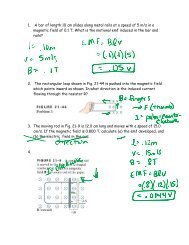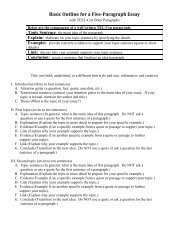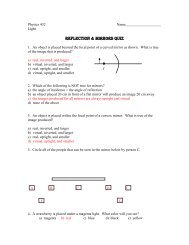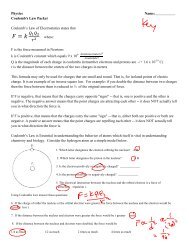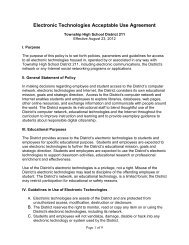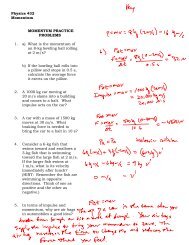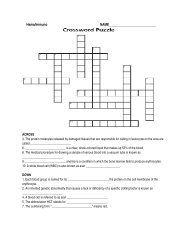Alas, Babylon. A Socratic Seminar is a dialogue
Alas, Babylon. A Socratic Seminar is a dialogue
Alas, Babylon. A Socratic Seminar is a dialogue
Create successful ePaper yourself
Turn your PDF publications into a flip-book with our unique Google optimized e-Paper software.
<strong>Alas</strong>, <strong>Babylon</strong> <strong>Socratic</strong> <strong>Seminar</strong> QuestionsName: ___________________________________We will be having a <strong>Socratic</strong> seminar on your summer reading, <strong>Alas</strong>, <strong>Babylon</strong>. A <strong>Socratic</strong> <strong>Seminar</strong> <strong>is</strong> a dialogbetween students to open-ended questions about the text. It will be your responsibility to prepare for the<strong>Socratic</strong> <strong>Seminar</strong> by writing down text support for what you believe to be the answers to these questions, andthen during the seminar, respond to one another with respect by carefully l<strong>is</strong>tening instead of interrupting.Students are encouraged to "paraphrase" essential elements of another's ideas before responding, either insupport of or in d<strong>is</strong>agreement. Please note that th<strong>is</strong> prep work will be collected for credit, so please detail yourthoughts carefully and include page numbers for support.1. What instances are there of people being in positions of power or public authority who should not be,before and after The Day? How does Randy's exerc<strong>is</strong>e of authority contrast with that of others, from thepilot Peewee to Bubba Offenhaus, Edgar Qu<strong>is</strong>enberry, and Porky Logan?2. What details reveal the specifics of race relations in the American South during thelate 1950s? Does the novel suggest any way of resolving the race <strong>is</strong>sue? How does Randy's relationshipwith Malachai go against h<strong>is</strong> community?3. In Chapter 4, Helen points out that her children, and all children in the late 1950s, "have lived under theshadow of war--atomic war. For them the abnormal has become normal." Do children today live under acomparable shadow or shadows? If so, what are the possible consequences?4. What <strong>is</strong> the sequence of the escalating breakdown of "normal" order, institutions, and public services?How do people react to the sudden absence of services and procedures that they--we--take for granted?Would reactions today be different or similar? What do you think <strong>is</strong> the most serious loss?5. In Chapter 5, Frank writes of bank president Edgar Qu<strong>is</strong>enberry that "He had forgotten the implacablelaw of scarcity." How would you define/describe that law? How does it come into play for the people ofFort Repose, and what effects does it have?
6. Is Helen's "inventory of necessities," in Chapter 6, real<strong>is</strong>tic and appropriate? What would be included inyour inventory of necessities in the case of a similar catastrophe? Why?7. To what extent does "survival of the fittest" apply in Fort Repose after The Day? What do Randy andthe others understand that phrase to mean? What do you understand it to mean?8. What do the deaths of key characters (Porky Logan, Edgar Qu<strong>is</strong>enberry, Malachai Henry etc.) illustrateabout human nature?9. What <strong>is</strong> the symbolic role of the image of darkness in <strong>Alas</strong>, <strong>Babylon</strong>?10. Is <strong>Alas</strong>, <strong>Babylon</strong> an optim<strong>is</strong>tic novel? Why or why not?


